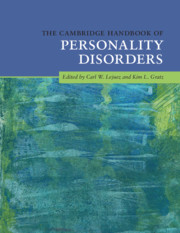Book contents
- The Cambridge Handbook of Personality Disorders
- The Cambridge Handbook of Personality Disorders
- Copyright page
- Contents
- Figures
- Tables
- Contributors
- Preface
- Part I Etiology
- Part II Models
- 5 Controversies in the Classification and Diagnosis of Personality Disorders
- 5a Three Unresolved Conceptual Issues in Personality Disorders: Commentary on Controversies in the Classification and Diagnosis of Personality Disorders
- 5b Classification of Complex Disorders Is a Challenge Solved by Simplicity: Commentary on Controversies in the Classification and Diagnosis of Personality Disorders
- 5c Final Thoughts: Author Rejoinder to Commentaries on Controversies in the Classification and Diagnosis of Personality Disorders
- 6 Categorical Models of Personality Disorders
- 6a Good Taxonomy Can Address Classification Challenges in Personality Pathology by Providing Informative Priors That Balance Information Compression and Fidelity: Commentary on Categorical Models of Personality Disorders
- 6b A Hierarchical, Dimensional Approach Can Advance Personality Disorder Research: Commentary on Categorical Models of Personality Disorders
- 6c The Search for Clinically Meaningful Dimensions Requires a Clinical Theory: Author Rejoinder to Commentaries on Categorical Models of Personality Disorders
- 7 The Five-Factor Model of Personality Disorders
- 7a Personality Disorders are Disorders of Personality: Commentary on the Five-Factor Model of Personality Disorders
- 7b Assessment and Operationalization of Personality Disorders from a Five-Factor Model Perspective: Commentary on the Five-Factor Model of Personality Disorders
- 7c Challenges but Optimism Regarding the Adoption of Trait Models of Personality Disorders: Author Rejoinder to Commentaries on the Five-Factor Model of Personality Disorders
- 8 Interpersonal Models of Personality Pathology
- 8a Interpersonal Nuance in Context: Commentary on Interpersonal Models of Personality Pathology
- 8b Contextual Dynamics in the Interpersonal Theory of Personality and Personality Disorder: Commentary on Interpersonal Models of Personality Pathology
- 8c Expanding on Interpersonal Models of Personality Pathology: Author Rejoinder to Commentaries on Interpersonal Models of Personality Pathology
- Part III Individual Disorders and Clusters
- Part IV Assessment
- Part V Treatment
- Index
- References
5c - Final Thoughts: Author Rejoinder to Commentaries on Controversies in the Classification and Diagnosis of Personality Disorders
from Part II - Models
Published online by Cambridge University Press: 24 February 2020
- The Cambridge Handbook of Personality Disorders
- The Cambridge Handbook of Personality Disorders
- Copyright page
- Contents
- Figures
- Tables
- Contributors
- Preface
- Part I Etiology
- Part II Models
- 5 Controversies in the Classification and Diagnosis of Personality Disorders
- 5a Three Unresolved Conceptual Issues in Personality Disorders: Commentary on Controversies in the Classification and Diagnosis of Personality Disorders
- 5b Classification of Complex Disorders Is a Challenge Solved by Simplicity: Commentary on Controversies in the Classification and Diagnosis of Personality Disorders
- 5c Final Thoughts: Author Rejoinder to Commentaries on Controversies in the Classification and Diagnosis of Personality Disorders
- 6 Categorical Models of Personality Disorders
- 6a Good Taxonomy Can Address Classification Challenges in Personality Pathology by Providing Informative Priors That Balance Information Compression and Fidelity: Commentary on Categorical Models of Personality Disorders
- 6b A Hierarchical, Dimensional Approach Can Advance Personality Disorder Research: Commentary on Categorical Models of Personality Disorders
- 6c The Search for Clinically Meaningful Dimensions Requires a Clinical Theory: Author Rejoinder to Commentaries on Categorical Models of Personality Disorders
- 7 The Five-Factor Model of Personality Disorders
- 7a Personality Disorders are Disorders of Personality: Commentary on the Five-Factor Model of Personality Disorders
- 7b Assessment and Operationalization of Personality Disorders from a Five-Factor Model Perspective: Commentary on the Five-Factor Model of Personality Disorders
- 7c Challenges but Optimism Regarding the Adoption of Trait Models of Personality Disorders: Author Rejoinder to Commentaries on the Five-Factor Model of Personality Disorders
- 8 Interpersonal Models of Personality Pathology
- 8a Interpersonal Nuance in Context: Commentary on Interpersonal Models of Personality Pathology
- 8b Contextual Dynamics in the Interpersonal Theory of Personality and Personality Disorder: Commentary on Interpersonal Models of Personality Pathology
- 8c Expanding on Interpersonal Models of Personality Pathology: Author Rejoinder to Commentaries on Interpersonal Models of Personality Pathology
- Part III Individual Disorders and Clusters
- Part IV Assessment
- Part V Treatment
- Index
- References
Summary
This rejoinder points out that the psychometric properties of trait domains have, at least at present, limited clinical relevance to treatment choice for the most severe personality disorders. Since patients with PDs are often misunderstood and mistreated, it is important to retain classifications that usefully guide treatment methods. The author also points out that the ICD-11 system for classifying personality disorders remains provisional, and does not have enough research behind it to solve the complex problems of PD classification. Since borderline personality disorder as a category can guide the choice of effective therapy, it is fortunate that it has been retained in ICD-11.
Keywords
- Type
- Chapter
- Information
- The Cambridge Handbook of Personality Disorders , pp. 118 - 119Publisher: Cambridge University PressPrint publication year: 2020



